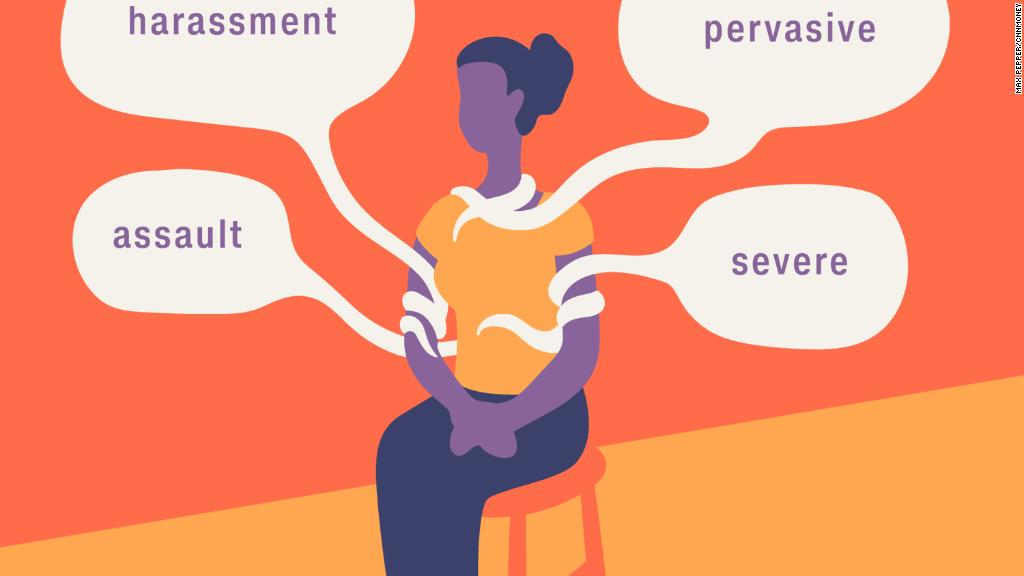
The words we use to describe inappropriate sexual behavior determine how the behavior is remembered, reported and even investigated.
But many people still aren't sure what constitutes harassment and what doesn't.
"There are a lot of weird myths out there about what is and what isn't sexual harassment," says behavioral scientist Lilia Cortina. "People don't realize how many things actually are sexually harassing conduct."
Here's a list of terms, where they fall on the legal spectrum and how they differ.
Sexual harassment
The Equal Employment Opportunity Commission defines a behavior as unlawful harassment when it creates "a work environment that a reasonable person would consider intimidating, hostile or abusive." That could include unwanted advances or harassment based on a person's gender.
But the behavior is only considered unlawful when it becomes "severe or pervasive," according to Merrick Rossein, law professor at City University of New York. And the application of those words is determined on a case-by-case basis.
"It's not a magical formula or an easy formula where you take out a book and you say, 'OK, sexually charged language happens 10 times within a three-month period, is that sufficient?'" Rossein says.
Cortina says the term sexual harassment is often used as a "broader umbrella" in her field, one that can encompass a multitude of behaviors -- everything from inappropriate jokes or comments to groping. Harassment can constitute sexual coercion, unwanted sexual advances, gender harassment or even assault.
Sexual assault
Physical acts of sexual assault can be a form of sexual harassment. The Department of Justice defines sexual assault as "any type of sexual contact or behavior that occurs without the explicit consent of the recipient." This can include fondling, attempted rape, groping or sexual penetration.
"Whenever there's some kind of sexual assault that occurs either in the workplace or it's perpetrated by a supervisor or a coworker, then it generally would fall under the rubric of both sexual assault and sexual harassment," Cortina says.
Related: How Anita Hill forever changed the way we talk about sexual harassment
Quid pro quo, or sexual coercion
You've probably seen this phrase a lot since news of Harvey Weinstein's alleged propositions broke in October. This is what many people think of as classic sexual harassment: the "sleep with me or you're fired" situations that make an employee's continued employment contingent on sexual cooperation.
"That is often the first form of conduct that comes to people's minds in the lay public when you say 'sexual harassment,' but it's actually the rarest form of sexual harassment," Cortina says.
Unwanted sexual attention
Unwanted attention can be anything from touching to repeated requests and pressure for dates. One or two incidents alone might not be a crime, legally speaking, but repeated attempts or patterns can rise to the level of harassment.
If this attention involves a bribe or a threat, it's then considered sexual coercion, or "quid pro quo" harassment.
Gender harassment
Sexist jokes, stereotypes or aggression toward a person because of their gender is considered gender harassment.
According to Cortina, it's actually the most common form of sexual harassment -- and yet many people have trouble thinking of it as harassment because this type of behavior is less about "come-ons" and more about "put-downs."
Rossein points to an evolution on this front, with courts in the 1990s beginning to distinguish between sexual harassment and gender harassment. Now, he says, many see this as something that contributes to the hostile work environment mentioned in the EEOC's definition.
"You know, 'You're gonna be pregnant and you should be barefoot home with your husband' and all kinds of sexist language, if that becomes 'pervasive,' courts start recognizing that as a form of hostile work environment," he says.
Ambient sexual harassment
Maybe your colleagues tape sexual jokes on breakdroom doors, download pornographic screensavers to their work laptops or scrawl crude remarks on office whiteboards. Even without any inappropriate touching or propositioning, that kind of behavior is still considered a form of harassment.
"A lot of people don't think about that. If it's not targeted at them, personally, it can still be sexual harassment," Cortina says. "It doesn't have to imply any kind of sexual advance."
CNN will host a town hall on sexual harassment Thursday at 9pmET. What questions would you like us to address? Please contact us using #CNNTownHall or Text, iMessage or WhatsApp 347-322-0415
